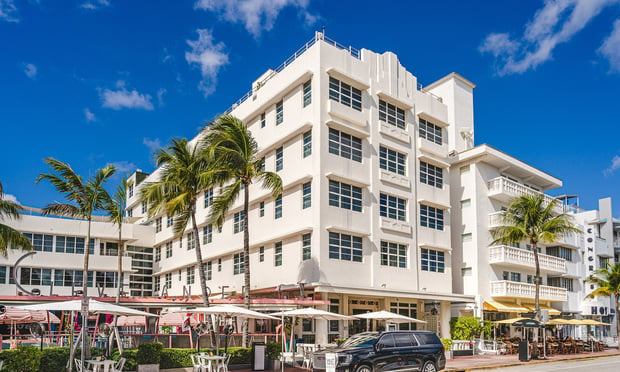PHOENIX-There’s always a little risk in opening new hotel properties - but then there’s also risk, wholly deserving to be italicized. Some would say the latter is associated with opening a hotel property abroad but, as panelists at the Lodging Conference’s Global Hospitality Insights panel revealed, taking a brand overseas is not as scary as some might think. In fact, the assembled speakers talked candidly about how they’re looking to new markets and that technology has helped this to become easier than ever before.
Interestingly enough, the discussion kicked of answering the question: How do you get into foreign markets? And is it worth it? Even though each representative hailed from a different company with a different agenda, they all concurred that global expansion can be a win – as long as you do it the right way.
Chris Port, head of development Caesars Global Living was direct: “We want to own that global customer,” and he feels this can be achieved through the unique incentives and offers that his company provides.
On the other hand, Stephanie Sonnabend, president with the Sonesta Collection Hotels Resorts Suites – a brand that has been international for years – feels that the world has “shrunk.”
“We’re seeing a lot more customers traveling around the world, with the Internet, there’s a lot more access to information,” she added, raising the key point: “It’s easier in some of these developing countries to make money with rates and occupancies in the United States. “
D.J. Rama, president JHM Hotels concurs, and said “In emerging markets, you’re riding the wave.” However, will all this optimism and the higher profit margins that can be achieved in developing countries, it’s a bit easy to get star-struck and forget that key risk. Clifford J. Risman, partner at Gardere Wynne Sewell LLP addressed the potential problems to be found in foreign markets.
“When our clients come to us and talk about going overseas,” he said, “the first conversation we always have is ‘why are you doing it and what are your future plans?’ He further extrapolated on how the “brain damage,” time and expenses involved with global expansion can be different depending on the country. His key advice was to know the country before you go – something that can be enhanced in Edward Blum’s view – he is the executive vice president of development and acquisitions with Interstate. He feels that a partner is key to success abroad, commenting that his company would never have entered India had it not been for their relationship with the Rama family.
Risman continued, “In our experience all of clients have to have someone local…but it’s a fine line. ..business is done very differently [overseas] than it is here in the States. There’s got to be a balance between finding the right partner and they way people do business in that country [and how people do it here at home].”
Despite the risk, all on the panel realize that the rewards are worth it, but the key is being smart about their decsions and continuing to evaluate the overseas situation. And this isn’t always something financial. Politics, local laws and the threat of an uprising can change things on a time. Just ask Michael Evans, executive vice president, global development with MGM Hospitality. His company opened up in Cairo and he explained that the Arab Spring took them by surprise. “No one saw that coming,” he said. “Cairo always seemed like a stable, safe place. It’s a big issue, but it’s always a risk you have to assess.”
Despite these less than savory developments in foreign countries, all on the panel were looking to the next big place and the next hot market. In fact, the conversation closed on an upbeat note, with Rama highlighting how his company helped establish a university in India, and all panelists weighing in on the next big foreign market. For several in the group, Southeast Asia is the place to look towards next, with countries like Malaysia, Thailand and even Vietnam and Cambodia listed. Both Sonnabend and Blum said South America was a “hot” market. “There are many communities and secondary markets where there are virtually no hotels,” Sonnabend added.
Interestingly for Port, the United States is where his company is focusing its attention, here using technology to its full capacity. “We’re looking at the US,” he said, “All the big five companies are everywhere…we don’t have those inherent conflicts [ in America.]We have a rewards program that’s really strong, we serve 100M guests a year. We’re excited about he US and doing entertainment properties here.”
And the technology aspect? Well, Port may not be name dropping Twitter accounts and Facebook pages and strategies yet, but he is interested in behavioral marketing. “We have databases on 40 million members, we have logarithms on each person, we’ve taken it to the next step; we’re very forward-looking.” He concluded: “That’s where we think the future is – anticipating behaviors, motivating people and getting them to stay with you. “
Want to continue reading?
Become a Free ALM Digital Reader.
Once you are an ALM Digital Member, you’ll receive:
- Breaking commercial real estate news and analysis, on-site and via our newsletters and custom alerts
- Educational webcasts, white papers, and ebooks from industry thought leaders
- Critical coverage of the property casualty insurance and financial advisory markets on our other ALM sites, PropertyCasualty360 and ThinkAdvisor
Already have an account? Sign In Now
*May exclude premium content© 2024 ALM Global, LLC, All Rights Reserved. Request academic re-use from www.copyright.com. All other uses, submit a request to [email protected]. For more information visit Asset & Logo Licensing.








